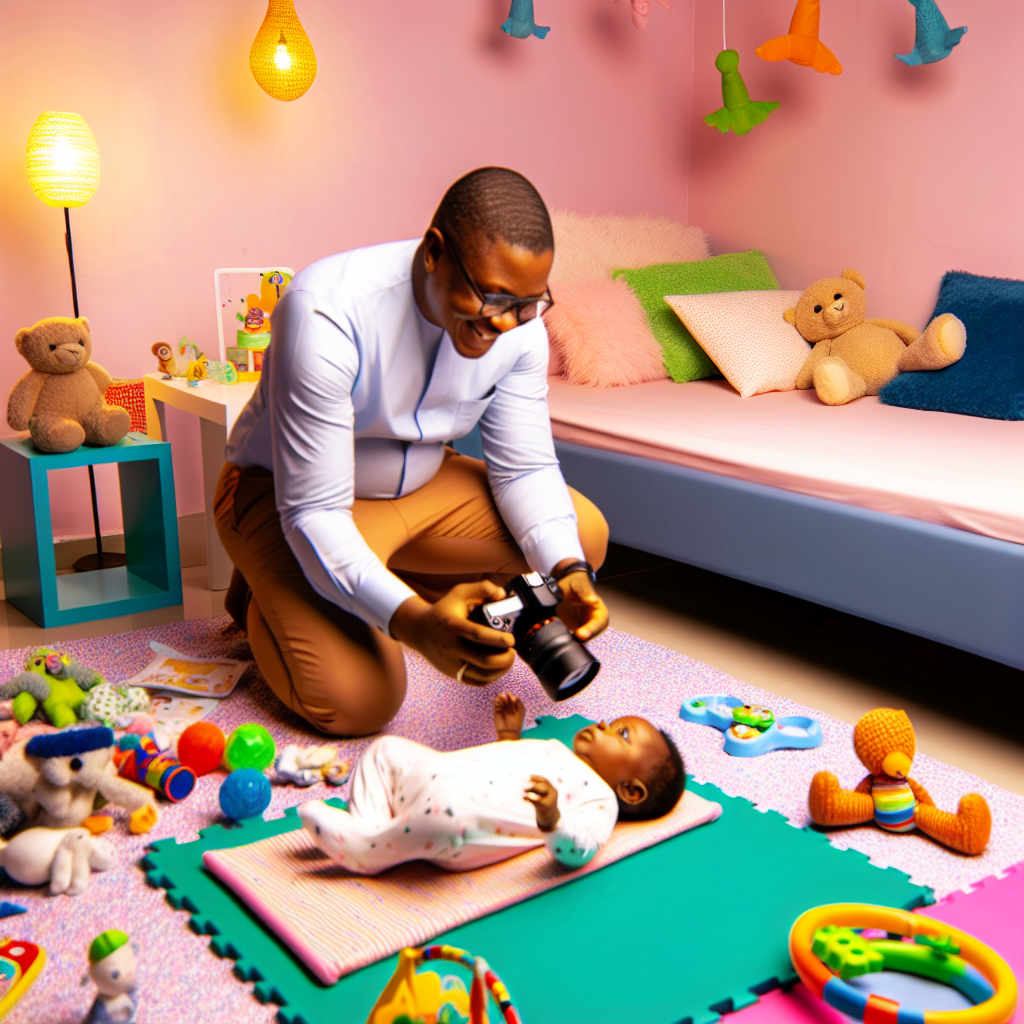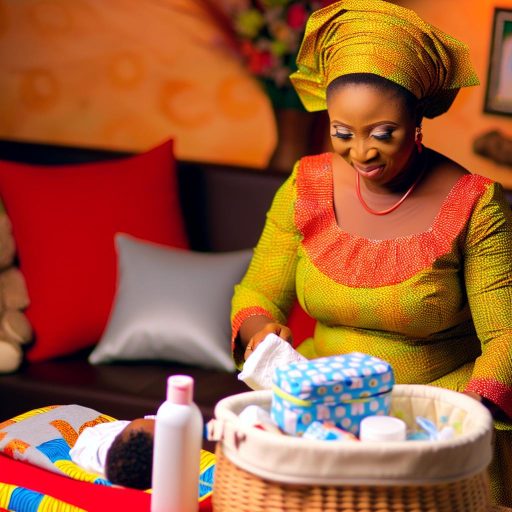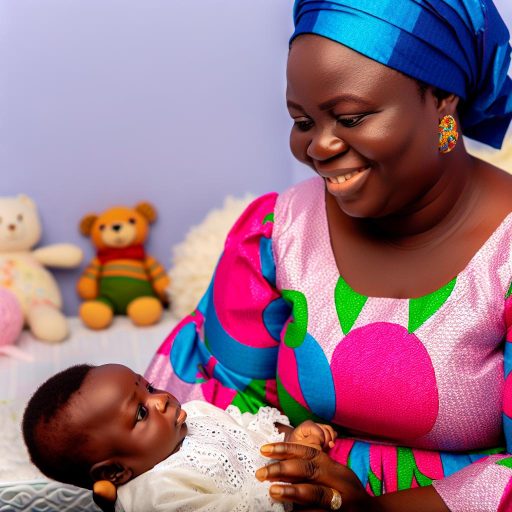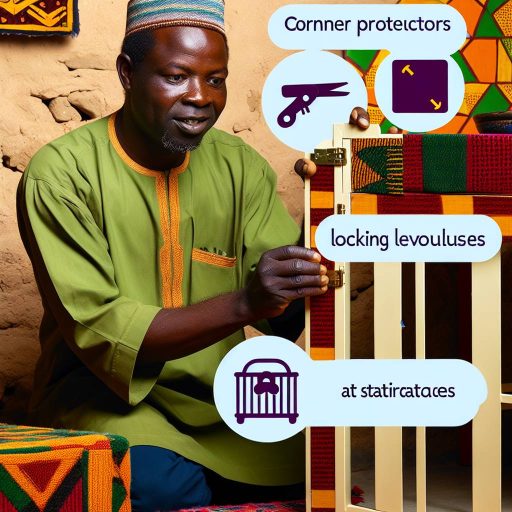Understanding the Importance of a Safe Environment for Infants
Creating a Secure Space
Creating a secure space for your baby is essential for their well-being.
This space allows them to explore and develop safely.
Infants are naturally curious and will investigate their surroundings.
A safe environment minimizes risks associated with their exploration.
Promoting Healthy Development
A safe environment contributes to healthy physical and cognitive development.
It provides the necessary foundation for learning and growth.
Moreover, this environment fosters emotional security for your baby.
Feeling secure helps infants develop trust and confidence.
Reducing Risks
Reducing risks in your baby’s environment is crucial for safety.
Secure furniture and remove sharp objects to prevent accidents.
Additionally, ensure that choking hazards are out of reach.
Monitor play areas to keep them safe and clean.
Encouraging Positive Interactions
A nurturing environment promotes positive interactions.
Daily routines that include reading, singing, and talking enrich your baby’s experiences.
These interactions also strengthen parent-child bonds.
Parenting Made Just for You
Get personalized Parenting Solutions tailored to your child’s needs. Transform your parenting journey with expert guidance in 1-3 days.
Get StartedFurthermore, a loving atmosphere supports emotional development.
Integrating Comfort
Integrating comfort in your baby’s space enhances their overall happiness.
Soft blankets, gentle lighting, and calming colors can create a serene atmosphere.
A comfortable environment helps soothe and relax your baby.
This, in turn, contributes to better sleep patterns.
Choosing Safe and Comfortable Spaces in Your Home
Assessing Your Home Environment
Begin by evaluating all areas of your home.
Identify any potential hazards that could affect your baby.
Remove items that pose risks, such as sharp objects or choking hazards.
Ensure that electrical outlets are covered and secure.
Creating a Nursery
Designate a cozy and safe space for your baby.
Choose a crib that meets current safety standards.
Place the crib away from windows and cords.
Use soft, breathable bedding to ensure comfort.
Add a comfortable chair for feeding and soothing.
Unveil the Perfect Name that Tells Your Family's Story
Let us help you find a name that embodies your family's values, traditions, and dreams. Our personalized consultation weaves cultural insights to create a name that's uniquely yours.
Get StartedEnsuring Safety in Common Areas
Make sure all common areas are baby-proofed.
Use safety gates to limit access to stairs and dangerous zones.
Store cleaning supplies out of reach or in locked cabinets.
Arrange furniture to create safe spaces for playtime.
Outdoor Spaces Considerations
If you have a yard, ensure it’s secure and safe.
Check for any harmful plants or sharp objects in the area.
Add soft grass or mulch for safe play environments.
Supervise your baby whenever they are outdoors.
Creating a Nurturing Atmosphere
The Importance of Love
Creating a loving environment starts with affection.
Affection fosters a strong bond between you and your baby.
Regular hugs and kisses can make a significant impact.
Additionally, a warm tone in your voice conveys love.
Spend quality time with your baby every day.
The Power of Positive Reinforcement
Positive reinforcement encourages desired behaviors.
Use praise to celebrate even the smallest achievements.
This helps build your baby’s self-esteem effectively.
Provide a nurturing response when your baby expresses emotions.
Establishing Consistent Routines
Consistency creates a sense of security for your baby.
Set regular feeding, nap, and play times.
A predictable schedule helps your baby feel safe.
It also aids in developing healthy sleep habits.
Creating a Safe Physical Environment
Your baby’s safety is paramount in establishing a loving environment.
Ensure the area is free of hazards and dangers.
Use soft furniture and remove sharp objects.
Additionally, baby-proof your home as necessary.
Encouraging Emotional Expression
Allow your baby to express their feelings freely.
Teach them how to communicate their needs effectively.
This promotes emotional intelligence as they grow.
Respond to their cries with comfort and care.
Fostering Social Connections
Social interactions are vital for your baby’s development.
Introduce them to friends and family often.
Observe how they interact with others and guide them.
Encourage sharing and empathy during playtime.
Learn More: Navigating Baby’s First Year: Essential Nigerian Parenting Tips for Newborn Care
Establishing Safety Measures
Childproofing Your Home
Creating a safe space for your baby starts with childproofing your home.
Begin by assessing each room carefully.
Identify potential hazards such as sharp edges and small objects.
Next, secure heavy furniture to prevent tipping.
Use corner guards to soften sharp edges on furniture and counters.
Electrical Safety
Cover all electrical outlets with safety plugs.
Ensure cords and wires are tucked away and out of reach.
Keep electrical devices away from water sources.
Consider using cord shorteners for a neater look.
Kitchen Safety
The kitchen can be a dangerous place for little ones.
Put childproof locks on lower cabinets and drawers.
Store sharp utensils and knives out of reach.
Keep cleaning supplies safely locked away.
Bathroom Safety
Prevent slips and falls in the bathroom with non-slip mats.
Install safety latches on cabinets containing medicines and chemicals.
Always supervise bath time to ensure your baby’s safety.
Outdoor Safety
Your yard should also be a safe haven for your child.
Fence in your yard to prevent wandering off.
Remove any toxic plants or hazardous materials.
Supervise your baby during outdoor play at all times.
Regular Inspections
Make it a habit to inspect your home regularly.
Look for new hazards as your baby grows and explores.
Stay proactive in maintaining a safe environment for your little one.
Delve into the Subject: Sleep Routines for Nigerian Newborns: What Every Parent Needs to Know
The Importance of Routine: Predictability for Your Baby’s Development
Providing Structure
Establishing a routine offers essential structure for your baby’s life.
This structure provides them with a sense of safety and security.
Baby routines help them anticipate what comes next in their day.
Predictability fosters a calm environment, reducing anxiety in both parent and child.
Enhancing Cognitive Development
Routine supports cognitive development during the early years.
Engaging babies in predictable activities aids their learning processes.
Every repetition boosts memory and understanding of the world around them.
These repeated experiences help their brains to form connections.
Supporting Emotional Growth
A consistent routine nurtures emotional resilience in babies.
Knowing what to expect encourages a sense of control.
This predictability enhances their ability to manage feelings effectively.
Establishing trust through routine strengthens the parent-child bond.
Creating Healthy Sleep Patterns
Routines play a crucial role in establishing healthy sleep habits.
Regular bedtimes signal to babies that it’s time to wind down.
Consistent sleep schedules help regulate their internal clocks.
Good sleep positively impacts their mood and development.
Facilitating Social Interactions
Routine activities create opportunities for social engagement.
Group classes or playdates introduce babies to their peers.
Shared routines encourage cooperative interactions and friendships.
This social aspect is critical for emotional and cognitive skills.
Delve into the Subject: Caring for Newborns: Essential Tips for First-Time Nigerian Parents

Encouraging Healthy Sleep Habits for a Secure Sleep Environment
Creating a Cozy Sleep Space
Start by choosing a safe crib or bassinet for your baby.
The sleeping area should be free from dangers like loose bedding.
Ensure the mattress fits snugly within the crib.
A firm mattress promotes better sleep and safety.
Use light blankets, avoiding heavy or bulky items.
Consider using a swaddle or sleep sack for warmth.
Establishing a Bedtime Routine
A consistent bedtime routine helps signal sleep time.
Start with calming activities like reading or singing.
Keep the environment quiet and dim before bedtime.
Reassure your baby with gentle touches and soft voices.
Encourage your baby to fall asleep independently.
Monitoring Sleep Conditions
Maintain a comfortable room temperature for sleep.
A room temperature between 68°F and 72°F is ideal.
Use white noise machines to drown out disturbances.
Consider blackout curtains to keep the room dark.
Regularly check the baby’s sleeping position for safety.
Being Mindful of Sleep Cues
Learn to recognize signs that your baby is sleepy.
Common signs include yawning and rubbing eyes.
Avoid keeping your baby awake past the point of tiredness.
Respond promptly to your baby’s sleep cues.
This fosters a sense of security and comfort.
Gain More Insights: Smart Parenting: Essential Tips for Raising Babies in Nigeria
Engaging with Your Baby: Effective Communication and Connection
The Importance of Communication
Effective communication forms the foundation of your relationship with your baby.
It helps you understand their needs better.
Moreover, it fosters a sense of security and love.
Talking to Your Baby
Start talking to your baby from day one.
Your voice comforts them and creates a bond.
Use a soothing tone to engage their attention.
Describe your actions to help them learn words.
Using Non-verbal Cues
Non-verbal cues are crucial in communicating with your baby.
Use facial expressions to convey emotions.
Smiles can make your baby feel safe and loved.
Gestures like waving can enhance understanding.
Active Listening
Listening actively to your baby’s sounds matters significantly.
Response to coos and gurgles encourages further communication.
By mirroring their sounds, you show that you care.
This interaction helps your baby develop language skills.
Creating a Routine
Establishing a communication routine sets expectations.
Regularly reading to your baby promotes language development.
Incorporate songs and nursery rhymes for added fun.
Consistent interaction helps build trust and rapport.
Encouraging Exploration
Encourage your baby to explore their environment.
Point out objects and describe them as they play.
Engage in playtime activities together for connection.
This playful interaction stimulates learning and discovery.
Monitoring and Responding to Your Baby’s Needs: The Key to Emotional Security
Understanding Your Baby’s Signals
Your baby communicates through various signals.
Recognizing these signals is essential for emotional security.
Different sounds, movements, and expressions convey their needs.
For instance, a cry might indicate hunger or discomfort.
Responding promptly helps your baby feel understood.
Creating a Responsive Environment
Establishing a nurturing atmosphere is vital.
Immerse your baby in a stimulating and safe space.
Use gentle sounds and soft lighting to create comfort.
Introduce visually appealing toys to engage their curiosity.
Additionally, spend time holding your baby close.
Building Trust Through Consistency
Your reactions should be consistent to promote trust.
Establishing routines helps your baby feel secure.
Consistent feeding and sleeping schedules are beneficial.
This predictability fosters a sense of safety.
When your baby knows what to expect, they relax more.
Empowering Your Baby’s Exploration
Allowing safe exploration is important for development.
Provide opportunities for your baby to practice motor skills.
Encourage them to reach for toys or crawl around.
Always supervise to ensure their safety during exploration.
Reward their efforts with praise to boost confidence.
Being Present and Engaged
Your attentiveness nurtures emotional security.
Engage in eye contact to deepen your connection.
Respond to their coos and babbles with enthusiasm.
Share moments of joy through play and laughter.
This involvement strengthens your bond and builds trust.
Additional Resources
Do babies get confused if they are raised by a mother and a nanny …
Best Advice Ever: Raising a Proud Emotionally Healthy Black Child …
[E-Books for Sale]
Parenting in the Digital Age
₦2,250 • 15 Chapters • 100 pages
Explore 'Parenting in the Digital Age,' a guide to navigating tech use, safety, and education for modern families. Essential reading.
See All 15 Chapters of this E-Book
Raising Financially Smart Nigerian Kids: 425 Lessons on Money & Entrepreneurship
₦5,500 • 17 Chapters • 425 lessons
Stop letting your kids grow up financially clueless in a country full of untapped opportunities.






